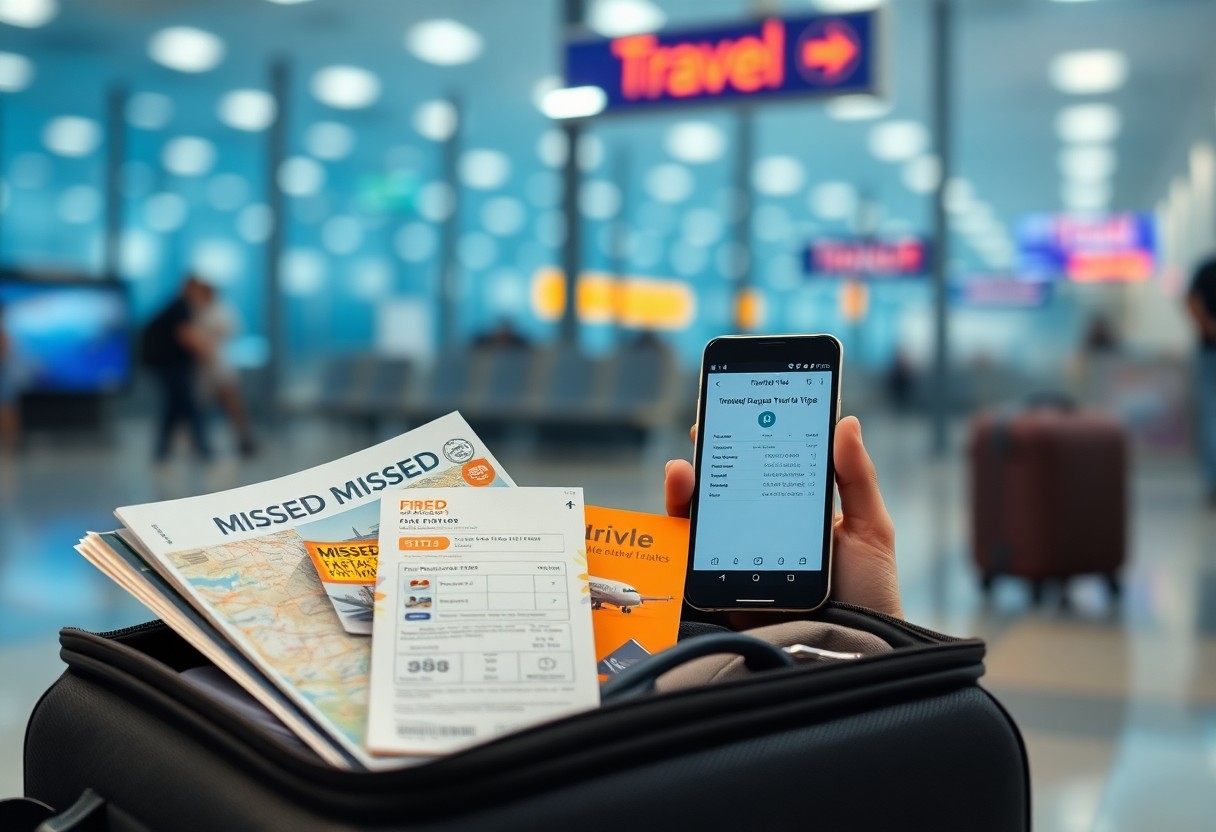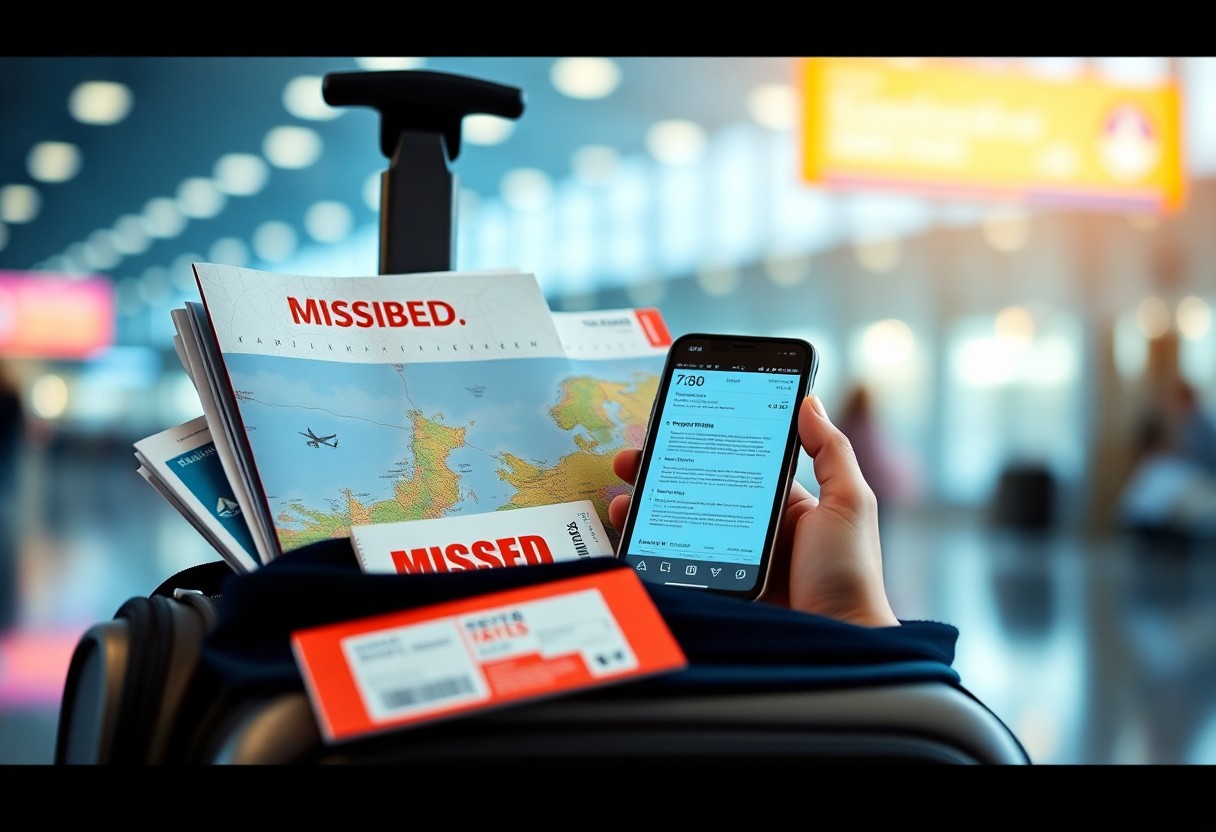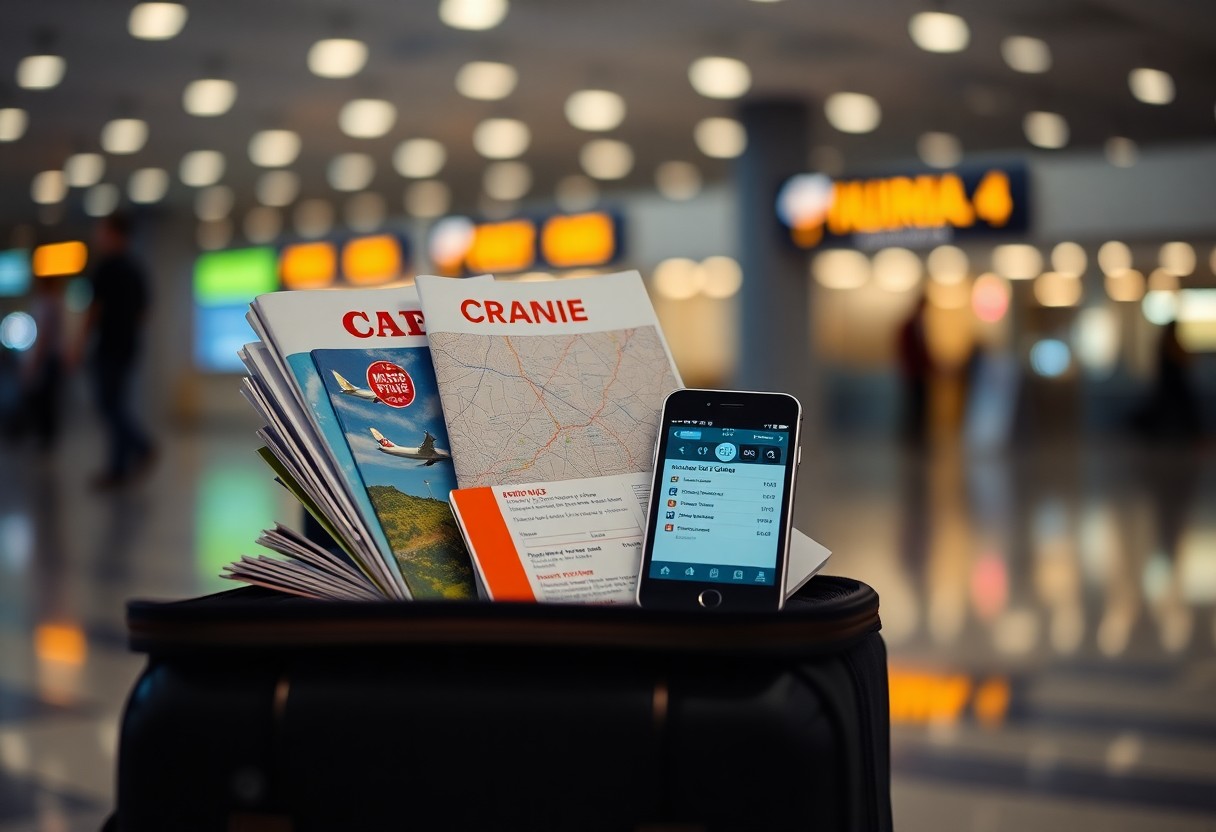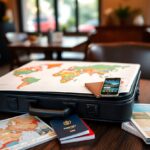
Key Takeaways:
- Plan your itinerary with flexibility to accommodate unexpected changes and new opportunities.
- Research local customs and regulations to respect cultural norms and avoid misunderstandings.
- Avoid overpacking by bringing versatile clothing and necessarys tailored to your destination’s climate.
- Stay aware of your budget by tracking expenses and preparing for emergency funds.
- Prioritize travel insurance to cover health issues, cancellations, and lost belongings for peace of mind.
Understanding Travel Mistakes
Your journey to becoming a savvy traveler starts with recognizing common travel mistakes. These errors, ranging from poor planning to underestimating local customs, can disrupt your experience and cause unnecessary stress. By understanding what these missteps are and why they happen, you empower yourself to make better decisions, ensuring smoother, more enjoyable travels. Awareness is the first step toward turning potential pitfalls into opportunities for growth and adventure.
Why Do Travelers Make Mistakes?
To navigate unfamiliar environments, travelers often rely on limited knowledge or assumptions, which leads to mistakes. Time pressure, excitement, and the lure of new experiences can cause you to overlook important details like visa requirements, local laws, or cultural norms. Misjudging budgets or underestimating logistical challenges also contribute to errors. Recognizing these triggers enables you to approach your trip more thoughtfully and prepare thoroughly, minimizing the chance of errors.
The Consequences of Travel Blunders
Beside inconveniencing yourself, travel mistakes can impact your safety, finances, and overall enjoyment. Overpacked luggage might slow you down, missed flights can derail schedules, and cultural misunderstandings may cause offense or discomfort. These blunders not only create immediate frustration but can also tarnish your travel memories. Understanding these consequences motivates you to plan carefully and make informed choices to protect your trip’s success.
Considering how even small oversights can escalate into larger issues, acknowledging the potential fallout helps you stay vigilant. For example, failing to secure travel insurance could leave you vulnerable to unexpected medical or logistical expenses. By predicting possible setbacks, you can proactively address them, transforming what could be negative experiences into manageable situations.
How to Learn from Previous Experiences
Understanding your past travel experiences, especially the mistakes, is key to evolving as a traveler. Reflecting on what went wrong and what worked well allows you to avoid repeating errors and to adopt better habits. This thoughtful analysis helps you build a personalized approach that improves your future trips’ comfort, enjoyment, and safety.
From reviewing trip journals, photos, or feedback from travel companions, you gain valuable insights into your travel patterns. Analyzing these experiences develops your problem-solving skills and prepares you to handle unexpected challenges with greater confidence. This ongoing learning process ensures each journey is better than the last.
Mistake #1: Overpacking
One common travel mistake you want to steer clear of is overpacking. Bringing more items than necessary not only weighs you down physically but also adds unnecessary stress to your trip. By packing lighter, you gain mobility and simplicity, making your journey more comfortable and enjoyable.
The Impact of Overpacking on Your Travel Experience
Among the challenges overpacking creates, limited mobility is a significant one. Carrying heavy luggage can tire you quickly, limit your transportation options, and even lead to extra fees on airlines. Overpacking also makes finding and organizing your items more difficult, which detracts from your overall travel experience.
Best Practices for Efficient Packing
Behind efficient packing is thoughtful planning and strategic selection of vitals versus extras. Start by making a list that aligns with your itinerary and climate, then prioritize versatile clothing and items. Rolling clothes instead of folding and using packing cubes can maximize space and keep you organized throughout your trip.
Consequently, adopting techniques like mixing and matching outfits, limiting shoes, and packing dual-purpose items can dramatically minimize what you carry. This approach reduces clutter and ensures you have everything you need without the burden of excess luggage.
Essential Packing Tools and Resources
Below are tools that can transform how you pack: lightweight luggage, compression bags, and digital packing checklists. These resources help optimize space and maintain organization, simplifying your preparation and travel.
It’s also helpful to use smartphone apps designed for packing assistance. These apps provide personalized lists based on your destination and trip details, further enhancing your efficiency and ensuring you don’t overlook important items.
Mistake #2: Not Checking Visa or Entry Requirements
Despite the excitement of planning your trip, skipping the step of verifying visa or entry requirements can lead to major setbacks. Border authorities enforce these rules strictly, and failing to comply can result in denied entry or unexpected delays. By actively confirming what documentation you need beforehand, you avoid this unnecessary hassle and ensure your journey begins smoothly and continues without interruption.
The Importance of Researching Entry Restrictions
Any traveler must recognize the importance of researching entry restrictions before departure. Countries often update their policies based on political, health, or security concerns, and these changes directly impact your eligibility to enter. Taking the time to understand the current requirements not only ensures a stress-free arrival but also helps you prepare any additional documents or permissions that may be necessary.
Tools for Checking Visa Requirements
Behind every successful international trip lies solid preparation using reliable visa-checking tools. These resources provide up-to-date information on entry rules, document needs, and processing times, giving you clear guidance tailored to your nationality and destination.
Tools such as official government websites, embassy portals, and visa assistance platforms offer comprehensive data about visa types, fees, and application procedures. Utilizing these resources allows you to plan your visa application wisely, understand timelines, and avoid falling foul of any procedural nuances. This proactive approach minimizes surprises at the border and ensures your travel plans are on firm ground.
Common Visa Mistakes to Avoid
About the typical visa mistakes, many travelers underestimate application timelines, misunderstand visa types, or neglect to carry necessary supporting documents. These missteps can jeopardize your trip, causing delays or even refusal of entry.
Another frequent error includes ignoring expiry dates on existing visas or passports, which often leads to last-minute complications. Additionally, not having photocopies of your documentation or failing to follow specific application instructions may result in avoidable processing delays. Being vigilant about these details keeps your journey hassle-free and secures your access to your destination.
Mistake #3: Forgetting Travel Insurance
After planning your perfect trip, neglecting travel insurance can leave you vulnerable to unexpected expenses like medical emergencies or trip cancellations. Without coverage, you may face significant out-of-pocket costs that could have been avoided. Ensuring you have the right travel insurance provides peace of mind and financial protection, so you can focus on enjoying your journey instead of worrying about potential setbacks.
Understanding the Types of Travel Insurance
Forgetting to explore the different types of travel insurance can mean you miss out on coverage tailored to your needs. Generally, travel insurance falls into these categories:
- Trip Cancellation/Interruption
- Medical and Emergency Evacuation
- Baggage Loss/Delay
- Accidental Death and Dismemberment
- Flight Delay Coverage
| Type | Coverage |
|---|---|
| Trip Cancellation/Interruption | Reimburses non-refundable trip costs if canceled due to covered reasons. |
| Medical and Emergency Evacuation | Covers medical expenses and emergency transport abroad. |
| Baggage Loss/Delay | Compensates for lost or delayed luggage. |
| Accidental Death and Dismemberment | Provides benefits in case of serious injury or death during the trip. |
| Flight Delay Coverage | Compensates costs related to significant flight delays. |
This breakdown will help you select the coverage that best fits the nature of your travel.
Analyzing Coverage Options
Understanding your travel insurance options helps you choose a policy that matches your trip’s risk profile. Look closely at coverage limits, exclusions, and deductibles to avoid surprises. Policies vary widely in what they cover and under what conditions you can file a claim. This analysis empowers you to choose a plan that provides real value and adequate protection.
Even if insurance seems like an extra expense, comprehensive coverage can save you thousands in emergencies. Comparing providers and reading policy details carefully ensures you don’t purchase insufficient coverage or overlap with existing policies, like credit card protections. Being well-informed means you can confidently select the best fit for your travel needs.
When to Purchase Travel Insurance
To maximize the benefits of travel insurance, you should buy your policy soon after booking your trip. Purchasing early helps you gain coverage for unforeseen events like illness or cancellations before your departure date. Some policies also offer added protections when bought promptly, including coverage for pre-existing conditions if purchased within a specific time frame.
The timing of your purchase can affect both coverage and price. Waiting too long may limit the options available or exclude certain protections. By securing insurance early, you position yourself to handle disruptions effectively and avoid financial risks that arise from last-minute policies or no insurance at all.
Mistake #4: Trying to Do Too Much in One Trip
Not packing your days with endless activities helps you truly enjoy your travels. When you cram too many destinations and tours into a single trip, you risk exhaustion and missing out on meaningful experiences. Giving yourself time to absorb the local culture, relax, and explore at a comfortable pace leads to a more fulfilling journey. Instead of rushing through your itinerary, focus on quality over quantity to make the most of your trip and come back refreshed and inspired.
Signs of Over-Planning and Burnout
Burnout from over-planning often manifests as fatigue, irritability, or a general feeling of overwhelm during your trip. When your schedule leaves little room for spontaneity or rest, you may find yourself rushing from one attraction to another without genuinely enjoying them. Struggling to keep up or losing enthusiasm for your chosen activities are clear signs that your itinerary needs to be adjusted for a healthier balance.
Strategies for Effective Itinerary Management
Itinerary management involves prioritizing your must-see spots, allocating realistic timeframes, and building in buffers for unexpected delays or relaxation. By simplifying your schedule, you make room for spontaneous discoveries and personal downtime. Use tools like travel apps or planners that help you visualize your days and avoid overbooking. This approach not only enhances your travel experience but also reduces stress.
Also, when crafting your itinerary, consider grouping attractions that are close to each other to minimize travel time. Incorporate breaks between activities and allow flexibility for changes based on how you feel each day. Planning rest days or lighter sightseeing days enables you to maintain energy throughout the trip and preserve your enthusiasm for every new destination.
Balancing Sightseeing and Relaxation Time
The best trips blend sightseeing with moments of relaxation. Allocating time to unwind by a café, beach, or park rejuvenates your mind and body, allowing you to enjoy your adventures more deeply. Prioritizing slow travel habits encourages you to savor each location rather than rush through checklists of attractions. This balance makes your travel more memorable and enjoyable.
And to achieve this balance, intentionally schedule downtime after busy days filled with activities. Take advantage of local wellness options, whether it’s a spa visit, nature walk, or meditation session, to recharge. By giving equal importance to exploration and rest, you’ll return from your journey feeling revitalized rather than depleted.
Mistake #5: Ignoring Local Customs and Etiquette
Many travelers overlook the importance of respecting local customs and etiquette, which can lead to awkward situations or even offend the people you meet. When you take the time to understand and honor local traditions, you not only show respect but also enrich your travel experience. Engaging appropriately with different cultures can open doors to genuine connections and a deeper appreciation of the place you’re visiting.
Importance of Cultural Awareness
Between greeting gestures, dress codes, and social norms, cultural awareness shapes how you interact in unfamiliar settings. You’ll find that adapting to these nuances helps avoid misunderstandings and shows respect for local values. Being culturally sensitive enables you to navigate new environments smoothly and fosters positive interactions with locals, making your journey more rewarding.
Researching Local Customs Before You Go
Across various destinations, customs and etiquette can vary widely, so taking the time to research before your trip equips you with valuable information to avoid common pitfalls. Learning about local dining manners, religious practices, or communication styles prepares you to act appropriately and with confidence from the moment you arrive.
But gaining cultural knowledge isn’t only about avoiding mistakes; it’s also about enhancing your experience. Understanding local practices can help you engage more meaningfully, discover hidden gems, and appreciate traditions that guide daily life. This preparation transforms your travel from mere observation to active participation.
Resources for Cultural Education on the Go
Local guides, travel apps, and cultural centers are excellent tools for learning about customs as you travel. These resources provide real-time insights and can help you adjust to cultural expectations quickly if you encounter unfamiliar situations during your visit.
Customs often evolve and differ even within regions, so staying informed through local resources helps you stay respectful and aware. Utilizing interactive tools and seeking advice on the spot ensures your behavior aligns with local etiquette and enriches your travel experience.
Mistake #6: Relying Only on Cards or Only on Cash
For your trip, depending exclusively on cash or cards can limit your flexibility and security. While cards are convenient, they may face issues like foreign transaction fees, card blocks, or network failures. On the other hand, carrying only cash increases the risk of loss or theft. Balancing both payment options ensures you can manage expenses smoothly without unexpected hassles.
The Risks of Single Payment Methods
Cards sometimes fail due to network or system issues, merchant restrictions, or card blocks triggered by unusual activity. Conversely, carrying only cash risks theft, loss, and difficulty making large payments or purchases. This dependency can leave you stranded without access to funds, especially in emergencies or remote locations.
Tips for Managing Your Money Abroad
Methods for managing your money overseas include:
- Bring a mix of cash and at least two credit/debit cards from different networks.
- Inform your bank about your travel plans to avoid card blocks.
- Use prepaid travel cards or apps as a backup.
After preparing these options, you’ll reduce stress related to payments while traveling.
Due to varying acceptance of payment methods abroad, having multiple options increases your flexibility. Always keep emergency cash in a separate location and avoid using airport exchange desks with poor rates. Check your card’s foreign transaction fees and opt for fee-free alternatives when possible. Using mobile payment apps linked to your cards can be handy, but don’t rely solely on digital payments as connectivity varies. After planning your financial strategy carefully, you’ll enjoy smoother transactions wherever you go.
Safe Practices for Handling Currency
Beside carrying a balanced mix of cash and cards, you should take precautions with physical currency to avoid loss or theft. Using secure, hidden money belts or travel wallets helps protect your funds discreetly while moving around busy areas.
In fact, it’s wise to split your cash into different locations—some on you, some in your accommodation, and some in your luggage. Avoid flashing large amounts of money in public and exchange currency using reputable services to ensure authenticity. After adopting these habits, you will safeguard your finances and travel with greater confidence.
Mistake #7: Booking Everything Last Minute
Keep your travel plans flexible but avoid waiting until the very last moment to book flights, hotels, or tours. Booking at the last minute often leads to higher prices, limited availability, and more stress. Planning ahead allows you to secure better deals, have more choices, and enjoy a smoother travel experience. Take control by balancing spontaneity with thoughtful preparation to maximize your trip’s success.
How Last-Minute Bookings Can Impact Your Trip
By booking last minute, you often face inflated prices and fewer options for accommodations and flights, which can limit your experience and budget. Availability may be sparse, forcing compromises on quality or location. This rushed approach also adds unnecessary stress, leaving little time to research and plan activities, potentially turning your exciting getaway into a scramble just to get everything in place.
Best Timelines for Booking Travel Essentials
Bookings made several weeks to months in advance typically yield the best combination of price and availability. For flights, booking around 6-8 weeks ahead often offers optimal fares, while hotel reservations are best secured at least a month before your trip. If you plan to attend popular events or visit peak destinations, booking even earlier ensures you won’t miss out and can enjoy a wider selection.
But while early booking offers many advantages, staying somewhat flexible with your dates and plans can help you capitalize on occasional deals. Monitor pricing trends and be ready to lock in reservations when you spot a favorable offer. Balancing advance planning with opportunistic booking allows you to optimize both your budget and itinerary quality.
Tools for Finding Last-Minute Deals Strategically
On your quest for last-minute deals, leverage apps and websites specially designed to highlight discounted flights, hotels, and packages. Tools like Hopper, Skyscanner, and LastMinute.com can help you spot price drops and hidden bargains quickly. Use alerts and flexible date searches to stay informed and act fast when a great deal appears to keep your travel budget intact.
LastMinute services aggregate multiple travel options to give you real-time access to discounted rates that otherwise might be missed. These platforms often negotiate directly with suppliers to release unsold inventory at reduced prices, making them excellent resources for spontaneous travelers who still want to save. Combine these tools with your own research to maximize your chances of scoring the best last-minute offers.
Mistake #8: Not Backing Up Important Documents
Once again, overlooking the backing up of your imperative travel documents can cause unexpected stress and delays during your trip. Losing your passport, tickets, or reservation confirmations can halt your travel plans entirely. By proactively creating copies and storing them securely, you protect yourself from such setbacks. This step is a simple one that saves you time, money, and frustration. Consider it an imperative part of your travel preparation routine to travel with confidence and peace of mind.
Types of Important Travel Documents
At the start of your trip, identifying which documents you need to back up is necessary. These documents include:
- Passport and visa pages
- Travel insurance policies
- Flight and accommodation bookings
- Identification cards and driver’s license
- Emergency contact information
| Document Type | Examples |
|---|---|
| Travel Identification | Passport, Driver’s License |
| Travel Tickets | Flight Tickets, Train Passes |
| Accommodation | Hotel Booking Confirmations |
| Insurance | Travel and Health Insurance Policies |
| Emergency Contacts | Phone Numbers, Medical Info |
Recognizing these document types helps you target which files to safeguard, minimizing your risk of travel disruptions.
Methods for Document Backup and Storage
With many options for backing up your documents, you need to choose methods that fit your travel style and convenience. Using digital backups on cloud storage platforms and physical copies stored separately can provide layered security. Emailing copies to yourself or trusted contacts can serve as an additional safeguard.
Storage of these backups should be done thoughtfully: keep physical copies in a separate location from the originals, such as in your luggage or a hotel safe. When going digital, use encrypted or password-protected files to guard your personal information against unauthorized access.
Apps and Services for Travel Security
Important apps and services exist to help you securely store and access your travel documents while you’re on the go. Digital wallets, travel management apps, and encrypted cloud services allow you to retrieve your files from anywhere.
For instance, apps like Google Drive, Dropbox, or specialized travel apps can automatically synchronize your documents, making updates and sharing easy. Look for services that offer strong encryption and multi-factor authentication to enhance your travel security.
Mistake #9: Skipping Health Prep (Vaccines, Medications)
Despite the excitement of planning your trip, overlooking health preparations like vaccines and necessary medications can seriously impact your experience. Failing to address these health considerations puts you at risk of preventable illnesses and complications. Taking time to consult with healthcare professionals and research destination-specific health advisories ensures you stay protected and enjoy a safe journey.
Health Risks of Neglecting Preparation
On your travels, exposure to diseases uncommon in your home country can occur, increasing your risk of infections such as malaria, typhoid, or hepatitis. Neglecting vaccines or preventive medications can lead to severe health issues that disrupt your trip and result in costly medical treatments.
Guidelines for Vaccine and Medication Requirements
Before departing, you should check for required and recommended vaccines for your destination, including timing for administration to ensure effectiveness. Some medications, like antimalarials, must be started before travel and continued afterward to offer full protection.
In addition to consulting travel health clinics or your healthcare provider, use reputable resources like the CDC or WHO websites for the latest updates on required immunizations and preventative medicines. Tailoring this guidance to your personal health status and itinerary enhances your safety.
Creating a Personal Health Safety Plan
Mistake skipping a comprehensive health plan means you may not be prepared for emergencies or ongoing medical needs abroad. Planning ahead includes packing a travel health kit, understanding local healthcare options, and knowing how to access your medications when traveling.
Consequently, developing a personal health safety plan empowers you to manage unexpected situations confidently. Keep copies of prescriptions, know emergency contacts, and be familiar with travel insurance coverage to mitigate risks and maintain wellbeing throughout your trip.
Mistake #10: Not Learning Basic Local Phrases
Now, failing to learn even a few basic phrases in the local language can limit your travel experience significantly. When you only rely on English, you might miss out on deeper connections, local insights, and smoother navigation. Knowing simple greetings, directions, and expressions of gratitude can enhance your interactions and show respect for the culture you are visiting. It also helps you handle emergencies more effectively and opens doors to authentic experiences that might otherwise remain closed.
Importance of Language Skills in Travel
By learning local phrases, you gain not only practical communication skills but also cultural appreciation. Language skills help you break down barriers, build rapport with locals, and enrich your understanding of a place. They demonstrate your effort and openness, encouraging friendlier responses and insider tips. These benefits extend beyond basic conversations and support your safety, comfort, and overall enjoyment during your trip.
Key Phrases for Each Destination
Destination-specific key phrases vary, but you should focus on greetings, polite expressions, and crucial questions. Phrases like “hello,” “please,” “thank you,” “how much,” and “where is…” are universally valuable. Tailoring your language skills to each destination enables you to interact respectfully and confidently, enhancing your travel experience and making daily tasks easier.
Even if you have limited time before your trip, identifying the most useful words and expressions relevant to your destinations will prepare you for more engaged and positive encounters. Studying localized phrases often also reveals cultural nuances and etiquette, helping you avoid misunderstandings and build genuine connections.
Recommended Language Learning Tools and Apps
Behind every successful traveler is a good set of language tools that simplify learning and practice. You can use apps like Duolingo, Babbel, or Memrise to quickly grasp crucial vocabulary and phrases. Many apps offer offline modes, speaking exercises, and phrasebooks tailored for travelers, helping you get comfortable with pronunciation and context before arriving.
Due to the flexibility and interactive nature of these resources, you can learn at your own pace, anytime and anywhere. Pairing apps with flashcards or language exchange platforms boosts retention and practical application, enabling you to communicate effectively and confidently during your journey.
Bonus Mistakes to Consider
All travelers benefit from avoiding common pitfalls beyond the usual checklist. These bonus mistakes often go unnoticed but can significantly impact your trip experience. By learning what to avoid and how to adapt, you enhance your travel enjoyment and reduce unnecessary stress, ensuring you make the most of every adventure.
Failing to Research Transportation Options
By neglecting to explore all transportation methods before arriving, you might miss out on faster, cheaper, or more convenient ways to get around. Whether it’s buses, trains, rideshares, or bike rentals, knowing your options in advance helps you plan efficiently and save both time and money during your trip.
Underestimating Travel Time Between Destinations
Underestimating how long it takes to move between places can disrupt your schedule, causing missed tours or rushed sightseeing. You need to allow ample travel time and anticipate delays to keep your itinerary smooth and enjoyable.
Options for transit can vary widely—even short distances might take longer due to traffic, road conditions, or limited infrastructure. Factoring in these variables gives you realistic timing and reduces last-minute stress as you shift from one location to another.
Overlooking Local Events or Seasonal Considerations
Across destinations, local festivals, holidays, or peak seasons affect availability, pricing, and crowd levels. Failing to account for these can lead to unexpected closures or overcrowded attractions that diminish your experience.
In fact, planning around local events can enrich your trip, offering unique cultural insights. Seasonal weather changes also impact activities and packing needs. Check local calendars ahead to align your plans with the best times to visit while avoiding avoidable inconveniences.
Final Thoughts on Avoiding Travel Mistakes
Unlike simply hoping for the best, careful preparation and mindful decisions will greatly enhance your travel experiences. By learning from common errors and adopting smarter habits, you can navigate your journeys with confidence and ease. Traveling wisely saves time, money, and stress, allowing you to focus on the joy and discovery each trip offers.
Recap of Key Strategies
One effective way to avoid travel pitfalls is thorough research—knowing your destination, transportation options, and cultural nuances. Planning flexibility into your schedule and packing appropriately are also important. Staying informed about health and safety guidelines ensures you are prepared for unexpected changes, making your trip smoother and more enjoyable.
Personal Accountability in Travel Planning
Above all, taking responsibility for your travel decisions empowers you to control your journey’s outcome. You are in charge of respecting your budget, managing time, and adapting plans when challenges occur. Owning your choices fosters resilience and helps you learn from each experience, turning errors into valuable lessons.
Another aspect of personal accountability is staying organized—keeping your documents, itineraries, and contacts accessible. This minimizes last-minute stress and enhances your ability to act quickly when unforeseen situations arise. By being proactive, you create a sense of control that elevates your travel experience.
Encouragement to Share Experiences and Tips
One of the best ways to improve your travel skills is by exchanging insights with others. When you share what you’ve learned, you contribute to a community of informed travelers who support each other. Consider these methods:
- Write blog posts or travel journals
- Participate in travel forums or social media groups
- Offer advice to friends planning trips
After sharing, you’ll find new perspectives that could further refine your approach and inspire your future travels.
Experiences enrich your understanding of the world, so sharing them benefits both you and fellow travelers. When you openly discuss challenges and successes, it encourages others to prepare better and avoid similar mistakes. Here are some practical ways to share:
- Create detailed reviews of accommodations and tours
- Record videos highlighting local tips and tricks
- Organize meetups or workshops about travel planning
After participating in these communities, you’ll discover a wealth of knowledge that supports continuous improvement in your travel endeavors.
FAQ
Q: What is a common mistake travelers make when booking flights, and how can it be avoided?
A: A frequent error is booking flights too late or at peak times, leading to higher prices and limited options. To avoid this, plan and book flights well in advance, and consider flying during off-peak hours or mid-week to secure better deals and more comfortable seats.
Q: Why is not researching local customs and etiquette a travel mistake, and what should travelers do instead?
A: Ignoring local customs can lead to misunderstandings or offending locals, which can negatively affect your experience. Travelers should research cultural norms, dress codes, and social etiquette of their destination beforehand to show respect and enhance interactions.
Q: How does overpacking affect a trip, and what is a better approach to packing?
A: Overpacking can cause unnecessary stress, higher baggage fees, and difficulty moving around. Instead, pack versatile clothing, prioritize necessarys, and use packing lists to keep luggage lightweight and manageable, allowing more flexibility during travel.
Q: What mistakes do travelers often make regarding travel insurance, and what is recommended?
A: Many skip purchasing travel insurance, risking financial loss due to cancellations, medical emergencies, or lost belongings. It’s advisable to obtain comprehensive travel insurance that covers health, trip interruptions, and valuables for peace of mind.
Q: How can poor itinerary planning impact a trip, and what strategy improves travel experiences?
A: Inadequate planning can lead to rushed visits or missed attractions. Instead, create a flexible itinerary that balances sightseeing with downtime, allows for unexpected discoveries, and accommodates local transportation options to enjoy a more relaxed and fulfilling journey.






2 thoughts on “Top 10 Travel Mistakes to Avoid (And What to Do Instead)”